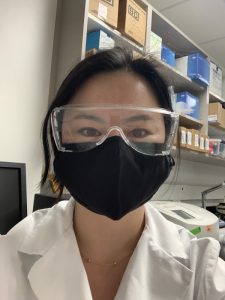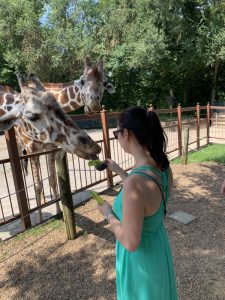 We are excited to welcome back Mari Schroeder to FSHN Research Journeys, our blog series that follows the research of graduate students in the Food Science and Human Nutrition program at The University of Florida. Mari is completing the second year of her Food Science Ph.D. program under the guidance of Dr. Michelle Danyluk. Read about her project on increasing the accessibility of food safety trainings for farmers in her research article from the first year of her graduate program.
We are excited to welcome back Mari Schroeder to FSHN Research Journeys, our blog series that follows the research of graduate students in the Food Science and Human Nutrition program at The University of Florida. Mari is completing the second year of her Food Science Ph.D. program under the guidance of Dr. Michelle Danyluk. Read about her project on increasing the accessibility of food safety trainings for farmers in her research article from the first year of her graduate program.
Over the past year, Mari expanded her research project to include studying microbial contamination. In this follow-up feature, learn about how her project has evolved as well as the top three things she wishes she had known going into her graduate program.
Thank you to Mari for this research update and fascinating look inside the FSHN graduate programs!
When we last spoke, you were starting your research on how to increase the accessibility of food safety trainings for farmers. What have you discovered over the past year?
One of the main components of this project is to make a series of short videos that communicate the requirements of the Produce Safety Rule and provide good agricultural practices that can be implemented to meet those requirements. Over the last year, I have learned that even though these are short videos–less than five minutes each–they require a lot of preparation to be effective and relevant for the target audience.

I have been lucky in that I am working with a fantastic team of faculty and staff from the University of Florida and Florida Agricultural and Mechanical University (FAMU). Together, we have spent hours creating scripts, brainstorming ideas for how to portray our content, and then shooting the videos at various locations. It has really been an “all hands on deck” experience, but it has been a lot of fun getting to know people who share the same interest in helping communities to provide safer food.
How has your research project changed from the first semester of your graduate program to the current semester? Why did it change?
When we last spoke, this project was the first project I was assigned. Since then, this project has become just one component of my overall research objective: assessing microbial contamination from food contact surfaces to fresh produce, from farm to fork. The other components of my research related to microbial contamination are much more lab-based and focus on the survivability and transfer of foodborne pathogens. These projects help support the food safety resources that we are creating because they provide the scientific reasoning as to why it is so important to mitigate food safety risks.

What are the next steps with your research?
The next step for the increasing accessibility of food safety trainings for farmers is to create an evaluation survey that will provide data to help us understand the true impact of our videos. Additionally, this data will also help us find out if there are specific topics that continue to be persistent issues and what areas to focus on when creating more resources.
In tandem, I will also be working on my lab-based projects, specifically looking at the survivability of Salmonella on tomatoes with various degrees of damage and ripeness.

How do you relax and recharge while working on your research project?
When I relax and recharge, I like to get out of the house, whether it be to walk my dogs or explore other areas of Florida. I find that this is the best for me because if I am in my house, I feel the need to check emails or continue to work on different parts of my projects.
What are the top three things you wish you had known going into your graduate program?

- Learn how to put your mental health first and take advantage of the resources the university provides. Graduate school is a lot of work with a lot of expectations, but that doesn’t mean that we must sacrifice our mental health. Establishing a self-care routine and learning how to set boundaries will help you navigate stress and be more productive.
- Your lab technicians and assistants are instrumental to your success, so don’t be afraid to get to know them or ask them for help.
- Invest in an Instant Pot. Seriously, they are so easy to use and make meal preparation and clean up so much easier.
Is there anything else you would like to add about your experience in the FSHN graduate program so far?
The FSHN graduate program has made graduate school an enjoyable experience. It is full of faculty and staff that prioritize the students and provide resources for professional and personal development.
Looking for more posts exploring graduate research projects in the Food Science and Human Nutrition Department at the University of Florida?
Revisit Mari’s first year in her Food Science Ph.D. program here.
Dive into the Research Journeys of other graduate students below.
M.S. Food Science
M.S. Nutritional Sciences
Ph.D. Food Science
Ph.D. Nutritional Sciences
 2
2
